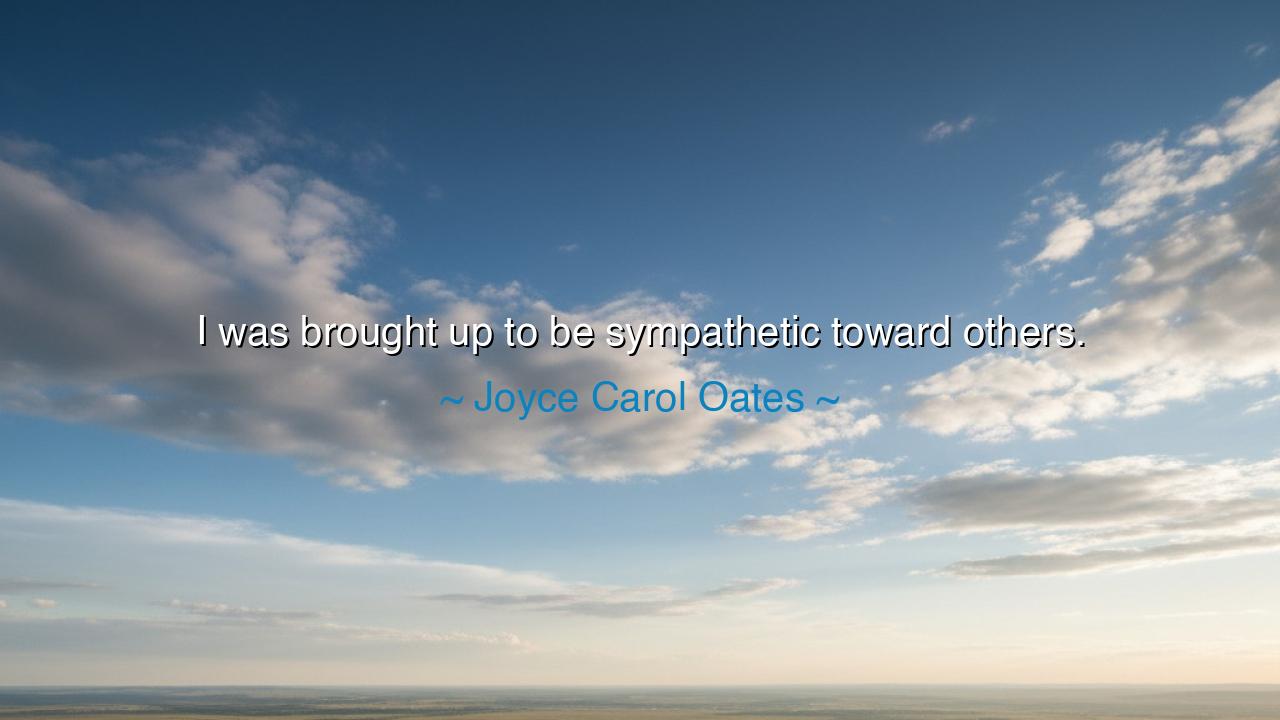
I was brought up to be sympathetic toward others.






"I was brought up to be sympathetic toward others." With these words, Joyce Carol Oates speaks of a profound lesson in human compassion and empathy—values instilled in her from an early age. To be sympathetic toward others is not simply to feel pity or sorrow for them, but to connect deeply with their suffering and joy, to understand their trials, and to offer solace or support when needed. In this simple declaration, Oates calls attention to the foundational importance of compassion as a guiding principle in life, one that serves to bind us to each other in a shared human experience.
In the ancient world, the idea of sympathy and empathy was not only a moral imperative but a vital thread that wove the fabric of society. Confucius, in his teachings, spoke of ren—benevolence and compassion—as the foundation of all virtue. He taught that one should treat others as they themselves would like to be treated, a principle that called for a deep understanding and respect for the human experience. Sympathy, as Oates reflects, is not simply a passive emotion but an active, purposeful act that demands us to step beyond ourselves, to share in the burdens of others, and to offer help when it is needed.
The ancient Greeks, too, recognized the power of sympathy as an essential aspect of the human condition. Aristotle wrote that the truly virtuous person is one who has great compassion for others, whose character is shaped by their ability to feel for those in pain and to respond with kindness and understanding. In his Nicomachean Ethics, he speaks of the importance of philia, the love and friendship that bind individuals in society, as a critical component of both personal and communal flourishing. Sympathy, for the Greeks, was a virtue that ensured a cohesive and just society, one where the needs of others were met with generosity and care.
Consider the example of Mother Teresa, whose life was a living testament to the values Oates speaks of. Raised with an inherent sense of compassion, she dedicated her life to the service of the poor, the sick, and the dying. Her sympathy for the suffering of others was not mere sentiment, but the impetus for action, guiding her to build hospitals, shelters, and schools for the most vulnerable in society. Through her work, she taught the world that true compassion requires more than words—it requires action, a willingness to give of oneself to alleviate the pain of others. Mother Teresa's example shows us that sympathy is a force for transformation in the world, one that transcends personal discomfort and leads to profound healing.
In the course of history, we have often witnessed the rise of great leaders and thinkers whose sympathy for their fellow human beings changed the course of nations. Abraham Lincoln, deeply moved by the suffering caused by the Civil War, spoke of the importance of charity, forgiveness, and reconciliation in healing the wounds of a divided country. His leadership, rooted in his ability to feel the pain of others, was instrumental in guiding the nation through its darkest period. Lincoln's legacy teaches us that sympathy, when exercised with wisdom and humility, can transform even the most difficult challenges into opportunities for unity and healing.
The lesson in Oates' statement is not merely an appeal to feel sorry for others, but a call to cultivate a deeper connection to those around us. It is easy to become lost in the individualism of modern life, to focus on one’s own needs and desires. But true fulfillment, as the ancients understood, is found not in selfish pursuits but in the act of reaching out, of sharing in the joys and sorrows of others. Sympathy requires a reaching out of the heart—it demands that we listen, understand, and act in ways that acknowledge the shared humanity of all people.
So, let us take this lesson to heart: we must not wait for others to ask for help, nor should we wait for the world to be perfect before we begin to show compassion. Let us practice sympathy daily, not just in times of crisis, but in the small moments of life—when we offer a kind word, when we listen deeply to someone’s pain, or when we offer our help without expecting anything in return. As Joyce Carol Oates was raised to understand, sympathy is not just a feeling—it is a way of living, one that can transform the world around us and bring us closer to the heart of what it means to be human. Through compassion, we build bridges that transcend differences and create a more unified and loving world.






AAdministratorAdministrator
Welcome, honored guests. Please leave a comment, we will respond soon